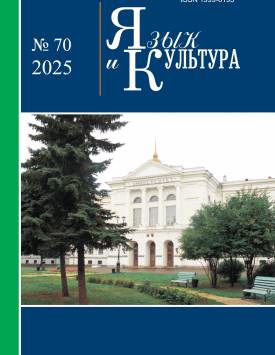Organizational and pedagogical conditions of plurilingual corporate training for adults in foreign languages
The study focuses on identifying and substantiating the organizational and pedagogical conditions for plurilingual corporate training for adults in foreign languages. The relevance of the topic is determined by the growing need of modern organizations for specialists capable of effectively interacting in multilingual and multicultural teams. It emphasizes that the traditional approach to foreign language training can be significantly improved by adopting the principles of plurilingual education, which ensures specialists’ readiness to solve complex professional tasks. These tasks require fluent proficiency in multiple languages, understanding of cultural contexts, and the development of cognitive-communicative skills. The aim of the study is to define the organizational and pedagogical conditions that will ensure the effectiveness of plurilingual corporate training. Thus, the research is based on the conceptual framework of plurilingualism, where languages are considered in interconnection and dialogical interaction rather than in isolation. The methodological foundation includes the principles of andragogy, the communicative-cognitive approach, and the technological approach in education. Particular attention is paid to the specific needs of adult learners, such as limited time for training, the practical significance of the material being studied, and its applicability in professional life. The analysis of scientific literature revealed the key components of the organizational and pedagogical conditions: the content component (selection of professionally relevant and authentic materials), the methodological component (use of interactive learning forms, modern digital technologies, etc.), the material component (consideration of resource support and infrastructure), and the result-oriented component (clear criteria for assessing the formation of foreign language competencies, the ability to switch between languages, and self-assessment). The practical significance of the study lies in formulating general recommendations for organizing plurilingual corporate training, which will be useful for its implementation. The study demonstrates that implementing the plurilingual approach in a corporate format is possible if the needs of adult learners are taken into account, active methods (case studies, project-based learning, discussions) are applied, and mechanisms for continuous feedback and reflection are employed, fundamentally grounded in the principles of plurilingualism. In the future, it is expected to further refine methodological support models, taking into account the industry specifics and organizational culture of different companies, as well as to study their impact on the content and approaches to organizing plurilin-gual training in a corporate environment. The author declares no conflicts of interests.
Keywords
plurilingualism,
plurilingual approach,
corporate training,
foreign languages,
organizational and pedagogical conditions,
andra-gogy,
intercultural communication,
professional orientationAuthors
| Lazareva Anna S. | Russian State Social University | lazareva@mail.ru |
Всего: 1
References
Устинова Т.В. Обучение иностранному языку с точки зрения плюрилингвального подхода // Общество: социология, психология, педагогика. 2022. № 10 (102). С. 159162. doi: 10.24158/spp.2022.10.24.
Piccardo E. Plurilingualism: Vision, Conceptualization, and Practices // Handbook of Research and Practice in Heritage Language Education. Springer International Handbooks of Education. Springer, Cham, 2016. doi: 10.1007/978-3-319-38893-9_47-1.
Cross R., D’Warte J., Slaughter Y. Plurilingualism and language and literacy education // Australian Journal of Language and Literacy. 2022. Vol. 45. P. 341-357. doi: 10.1007/s44020-022-00023-1.
Сысоев П.В., Потапова Е.Н. Корпоративное обучение профессиональному иностранному языку // Перспективы науки и образования. 2022. № 2 (56). С. 256-271. doi: 10.32744/pse.2022.2.15.
Шостак Е.В. Концепция плюрилингвизма в лингводидактике и обоснование термина «плюрилингвальное обучение» // Terra Linguistica. 2018. Т. 9, № 2. С. 71-85. doi: 10.18721/JHSS.9207.
Choi J., Cross R., Davies L.M. Looking towards plurilingual futures for literacy assessment // Australian Journal of Language and Literacy. 2022. Vol. 45. P. 325-340. doi: 10.1007/s44020-022-00021-3.
Халяпина Л.П. Концепции поли-/мульти- и плюрилингвального обучения в отечественной и зарубежной языковой политике // Вестник Нижегородского государственного лингвистического университета им. Н.А. Добролюбова. 2018. № 43. С. 141-151.
Устинова Т.В. Плюрилингвальный репертуар изучающего иностранный язык: подходы к лингвистическому описанию // Современное языковое образование: инновации, проблемы, решения : материала: XII науч.-практ. конф., Москва, 24 апреля 2021 года. М. : МПГУ, 2021. С. 681-692.
Гураль С.К. Обучение иноязычному дискурсу как сверхсложной саморазвивающейся системе (языковой вуз) : дис. д-ра пед. наук. Тамбов, 2009. 589 с.
Лазарева А.С., Безукладников К.Э. Андрагогика как базис мультилингвального корпоративного обучения // Язык и культура. 2023. № 62. С. 263-276. doi: 10.17223/19996195/62/14.
Сергеева М.Г., Даллакян А. В. Влияние плюрилингвизма на предметно-языковую интеграцию // Проблемы современного педагогического образования. 2019. № 63-4. С. 235-238.
Piccardo E. Plurilingualism as a Catalyst for Creativity in Superdiverse Societies: A Systemic Analysis // Frontiers in Psychology. 2017. Vol. 8. P. 2169. doi: 10.3389/fpsyg.2017.02169.
Galante A., dela Cruz J.W.N. Plurilingual and pluricultural as the new normal: an examination of language use and identity in the multilingual city of Montreal // Journal of Multilingual and Multicultural Development. 2021. Vol. 45, № 4. P. 868-883. doi: 10.1080/01434632.2021.1931244.
Семенова Е.Ю. Обучение взрослых иностранному языку // Российский внешнеэкономический вестник. 2016. № 2. С. 96-102.
Корзникова Н.В., Газизова А. И. Организация корпоративного обучения педагогических работников в учреждении дополнительного образования // Гуманитарные науки. 2019. № 1 (45). С. 79-83.
Лохонова Г.М. Создание организационно-педагогических условий для формирования корпоративной культуры у студентов вуза // Вестник Российского университета кооперации. 2013. № 4 (14). С. 101-104.
Алямкина Е.А., Рибокене Е.В., Флеров О.В. Профессионально-педагогические особенности корпоративного обучения иностранному языку // Наука и школа. 2020. № 2. С. 75-88. doi: 10.31862/1819-463X-2020-2-75-88.
Сорокоумова Е. А. Психолого-педагогические условия обучения взрослых // Педагогика и психология образования. 2014. № 4. С. 109-114.
Янова М.Г., Царская Т.С. Организационно-педагогические условия формирования навыков иноязычного профессионального общения у будущих врачей // Вестник Костромского государственного университета. Серия: Педагогика. Психология. Социокинетика. 2022. Т. 28, № 2. С. 165-173. doi: 10.34216/2073-1426-2022-28-2-165-173.
Onutz T. Foreign Languages in Non-Formal Adult Education - A New Trend // Proceedings of the Education, Reflection, Development, Seventh Edition (ERD 2019), 12-13 July, 2019, Babes-Bolyai University Cluj-Napoca. doi: 10.15405/epsbs.2020.06.51.
Kang X., Matthews S., Yip V., Wong P.C.M. Language and nonlanguage factors in foreign language learning: evidence for the learning condition hypothesis // npj Science of Learning. 2021. Vol. 6. P. 28. doi: 10.1038/s41539-021-00104-9.

